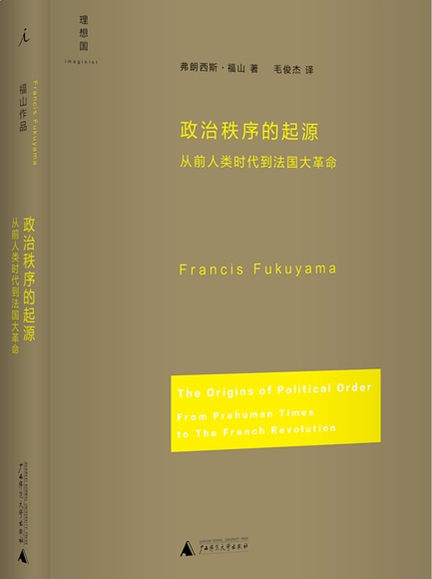Dinner with Francis Fukuyama
- By Zhang Yongle
 0 Comment(s)
0 Comment(s) Print
Print E-mail China.org.cn, November 24, 2012
E-mail China.org.cn, November 24, 2012
 |
|
Fukuyama: The Origins of Political Order (Chinese Translation) Guangxi Normal University Press |
The Chinese translation of Francis Fukuyama's Origins of Political Order was published this October. For the occasion, Fukuyama himself flew to Beijing for a warm-up campaign. The Department of Philosophy at Peking University held a forum in honor of his arrival. Given the opportunity to attend the forum, I got a chance to read an advance copy of his new book printed especially for attendees.
I should say that this is a book worth reading. Fukuyama's basic premise in his book is that good administration in a country needs a combination of three factors: national capability, rule of law and accountability (Democracy is one method of accountability in that the government is accountable to most of the people. But accountability may also exist in a government of nobles or oligarchs).
Fukuyama traces the historical origin of the aforementioned three factors and assesses how the combination of the factors translates into effective governance in different parts of the world.
He uses China, whose development of national capabilities is far more mature than Western countries, as an example of a typical state structure. In his book, he intentionally brings Chinese history to the front, making it feel like the course of Western history is a deviation from the way that China has been going. This goes in contrast to classic writers such as Max Weber.
To Chinese readers, Origins of Political Order feels like a "China-friendly" narrative. However, a breakthrough in the book's narrative does not mean a breakthrough in the author's theory. Fukuyama writes that although China has strong national capabilities, it still does not have rule of law and accountability. This lies in contrast to Western countries, where even though the process of state structure started later, the three factors achieved more balanced development.
Specifically, the first "mature combination" of the three factors occurred in Britain, and then expanded into other countries. Fukuyama includes a detailed analysis of Western history, exploring how the three factors gradually developed at different historical turning points. But in his analysis of China, his concern is almost entirely concentrated on the first factor, while he makes great efforts to expound on the lack of the other two factors.
At the Peking University forum, I put forward some criticisms of the book, saying that Fukuyama's analyses on China and Europe are imbalanced. In his discussion of Europe, he carefully displays the entire spectrum of European historical development in three-dimensional manner. However, in his China analysis, instead of displaying an overall picture, he only judges whether certain dimensions exist or not.
Did ancient China have nothing to contribute in the areas of rule of law and accountability? Maybe ancient China did not meet Fukuyama's standards for these two aspects. But this does not mean they should be completely ignored. At the end of the book, Fukuyama states that contemporary China, just like ancient China, is a strong country but does not have rule of law and accountability. This conclusion, unfortunately, is made without sufficient evidence.
In this regard, we can look at Wang Shaoguang's criticism on the US model of research into China's politics. Many US scholars label China's political system as "authoritarianism", which is used as umbrella term to describe every single government in Chinese history, including the Empress Dowager Cixi's government in the Qing Dynasty, Yuan Shikai's government, Chiang Kai-shek's government and the government of the Communist Party. In their eyes, China in the past 100 years has been just marching on the spot. This indicates a "poverty" in their theory: These researchers do not have enough concept tools to recognize the great changes in China's political history over the past 100 years. In this regard, Fukuyama offers nothing new in his analysis.
In his research of national capabilities, I don't think Fukuyama has contributed anything astonishing or forceful.






Go to Forum >>0 Comment(s)